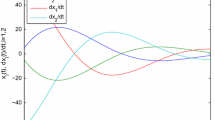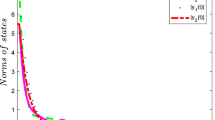Abstract
This article is concerned with the global exponential stability in Lagrange sense of bidirectional associative memory quaternion-valued inertial neural networks by non-reduced order and undecomposed approach. Firstly, for the completeness of the information carried by the model, the inertial term is not reduced in order, and the quaternion is not decomposed into four real values or two complex values. Then, for the sake of reducing the conservatism, auxiliary function-based inequalities and reciprocally convex inequality are applied to the set of quaternion. And several criteria for Lagrange stability are acquired in the form of linear matrix inequalities. Ultimately, numerical simulations are proved the feasibility of the outcomes.








Similar content being viewed by others
Explore related subjects
Discover the latest articles, news and stories from top researchers in related subjects.References
Kosko B (1987) Adaptive bi-directional associative memories. Appl Opt 26(23):4947–4960
Kosko B (1988) Bi-directional associative memories. IEEE Trans Syst Man Cybern 18:49–60
Nagamani G, Shafiya M, Soundararajan G, Prakash M (2020) Robust state estimation for fractional-order delayed BAM neural networks via LMI approach. J Frankl Inst 357(8):4964–4882
Lin F, Zhang Z (2020) Global asymptotic synchronization of a class of BAM neural networks with time delays via integrating inequality techniques. J Syst Sci Complex 33(2):366–382
Zhang L, Yang Y (2019) Finite time impulsive synchronization of fractional order memristive BAM neural networks. Neurocomputing 384:213–224
Yan M, Jiang M (2020) Synchronization with general decay rate for memristor-based BAM neural networks with distributed delays and discontinuous activation functions. Neurocomputing 387:221–240
Chen W, Wu A, Zhang J, Li B (2019) Adaptive control of Mittag–Leffler stabilization and synchronization for delayed fractional-order BAM neural networks. Adv Differ Equ 1:1–20
Zhao Z, Jian J (2014) Attracting and quasi-invariant sets for BAM neural networks of neutral-type with time-varying and infinite distributed delays. Neurocomputing 140:265–272
Xia Y, Kou K, Liu Y (2021) Theory and applications of quaternion-valued differential equations. Science Press, Beijing
Jiang B, Liu Y, Kou K, Wang Z (2020) Controllability and observability of linear quaternion-valued systems. Acta Math Sin Engl Ser 36(11):1299–1314
Cai Z, Kou K (2018) Solving quaternion ordinary differential equations with two-sided coefficients. Qual Theor Dyn Syst 17(2):441–462
Kameli Donachali A, Jafari H (2020) A decomposition method for solving quaternion differential equations. Int J Appl Comput 6(4):1–7
Li Z, Wang C, Agarwal RP, O’Regan D (2021) Commutativity of quaternion-matrix-valued functions and quaternion matrix dynamic equations on time scales. Stud Appl Math 146(1):139–210
Cheng D, Kou K, Xia Y (2018) A unified analysis of linear quaternion dynamic equations on time scales. J Appl Anal Comput 8(1):172–201
Zhu J, Sun J (2018) Existence and uniqueness results for quaternion-valued nonlinear impulsive differential systems. J Syst Sci Complex 31:596–607
Suo L, Feckan M, Wang J (2021) Quaternion-valued linear impulsive differential equations. Qual Theor Dyn Syst 20(2):1–78
Kou K, Liu W, Xia Y (2019) Solve the linear quaternion-valued differential equations having multiple eigenvalues. J Math Phys 60(2):023510
Cheng D, Kou KI, Xia Y (2020) Floquet theory for quaternion-valued differential equations. Qual Theor Dyn Syst 19(1):1–23
Liu Y, Zhang D, Lou J, Lu J, Cao J (2018) Stability analysis of quaternion-valued neural networks: decomposition and direct approaches. IEEE Trans Neural Netw Learn Syst 29(9):4201–4210
Xu X, Xu Q, Yang J, Xue H, Xu Y (2020) Further research on exponential stability for quaternion-valued neural networks with mixed delays. Neurocomputing 400:186–205
Qi X, Bao H, Cao J (2020) Synchronization criteria for quaternion-valued coupled neural networks with impulses. Neural Netw 128:150–157
Xiao J, Cao J, Cheng J, Zhong S, Wen S (2020) Novel methods to finite-time Mittag–Leffler synchronization problem of fractional-order quaternion-valued neural networks. Inf Sci 526:221–244
Deng H, Bao H (2019) Fixed-time synchronization of quaternion-valued neural networks. Phys A 527:1–16
Wei R, Cao J (2019) Fixed-time synchronization of quaternion-valued memristive neural networks with time delays. Neural Netw 113:1–10
Liu J, Jian J, Wang B (2020) Stability analysis for BAM quaternion-valued inertial neural networks with time delay via nonlinear measure approach. Math Comput Simulat 174:134–152
Wei R, Cao J, Huang C (2020) Lagrange exponential stability of quaternion-valued memristive neural networks with time delays. Math Meth Appl Sci 43:7269–7291
Chen D, Zhang W, Cao J, Huang C (2020) Fixed time synchronization of delayed quaternion-valued memristor-based neural networks. Adv Differ Equ 1:1–16
Babcock K, Westervelt R (1986) Stability and dynamics of simple electronic neural networks with added inertia. Phys Sect D Nonlinear Phenom 23:464–469
Angelaki D, Correia M (1991) Models of membrane resonance in pigeon semicircular canal type II hair cells. Biol Cybern 65(1):1–10
Mauro A, Conti F, Dodge F, Schor R (1970) Subthreshold behavior and phenomenological impedance of the squid giant axon. J Gen Physiol 55(4):497–523
He X, Li C, Shu Y (2012) Bogdanov-takens bifurcation in a single inertial neuron model with delay. Neurocomputing 89:193–201
Kumar R, Das S (2020) Exponential stability of inertial BAM neural network with time-varying impulses and mixed time-varying delays via matrix measure approach. Commun Nonlinear Sci Numer Simul 81:1–13
Duan L, Jian J, Wang B (2020) Global exponential dissipativity of neutral-type BAM inertial neural networks with mixed time-varying delays. Neurocomputing 378:399–412
Rekasius Z (1963) Lagrange stability of nonlinear feedback systems. IEEE Trans Autom Control 8(2):160–163
Tu Z, Jian J, Kang W (2011) Global exponential stability in Lagrange sense for recurrent neural networks with both time-varying delays and general activation functions via LMI approach. Nonlinear Anal Real World Appl 12(4):2174–2182
Tu Z, Cao J, Alsaedi A, Alsaadi F, Hayat T (2016) Global lagrange stability of complex-valued neural networks of neutral type with time-varying delays. Complexity 21:438–450
Tu Z, Cao J, Hayat T (2016) Global exponential stability in Lagrange sense for inertial neural networks with time-varying delays. Neurocomputing 171:524–531
Duan L, Jian J (2019) Global Lagrange stability of inertial neutral type neural networks with mixed time-varying delays. Neural Process Lett 51:1849–1867
Wu A, Zeng Z (2014) Lagrange stability of neural networks with memristive synapses and multiple delays. Inf Sci 280:135–151
Wu A, Zeng Z (2014) Lagrange stability of memristive neural networks with discrete and distributed delays. IEEE Trans Neural Netw Learn Syst 25(4):690–704
Tu Z, Wang D, Yang X, Cao J (2020) Lagrange stability of memristive quaternion-valued neural networks with neutral items. Neurocomputing 399:380–389
Tu Z, Cao J, Alsaedi A, Hayat T (2017) Global dissipativity analysis for delayed quaternion-valued neural networks. Neural Netw 89:97–104
Jian J, Wang B (2015) Global Lagrange stability for neutral-type Cohen–Grossberg BAM neural networks with mixed time-varying delays. Math Comput Simulat 116:1–25
Chen X, Li Z, Song Q, Hu J, Tan Y (2017) Robust stability analysis of quaternion-valued neural networks with time delays and parameter uncertainties. Neural Netw 91:55–65
Park P, Lee W, Lee S (2016) Auxiliary function-based integral/summation inequalities: application to continuous/discrete time-delay systems. Int J Control Autom Syst 14:3–11
Li N, Zheng W (2018) Synchronization criteria for inertial memristor-based neural networks with linear coupling. Neural Netw 106:260–270
Zhang Y, Jiang M, Fang X (2020) A new fixed-time stability criterion and its application to synchronization control of memristor-based fuzzy inertial neural networks with proportional delay. Neural Process Lett 52:1291–1315
Yogambigai J, Ali M, Alsulami H, Alhodaly M (2020) Global Lagrange stability for neutral-type inertial neural networks with discrete and distributed time delays. Chin J Phys 65:513–525
Sun L, Tang Y, Wang W, Shen S (2020) Stability analysis of time-varying delay neural networks based on new integral inequalities. J Frankl Inst 357:10828–10843
Acknowledgements
The authors are grateful for the support of the National Natural Science Foundation of China (Grant Nos. 61304162, 11601268).
Author information
Authors and Affiliations
Corresponding author
Additional information
Publisher's Note
Springer Nature remains neutral with regard to jurisdictional claims in published maps and institutional affiliations.
Rights and permissions
About this article
Cite this article
Zhao, R., Wang, B. & Jian, J. Lagrange Stability of BAM Quaternion-Valued Inertial Neural Networks via Auxiliary Function-Based Integral Inequalities. Neural Process Lett 54, 1351–1369 (2022). https://doi.org/10.1007/s11063-021-10685-6
Accepted:
Published:
Issue Date:
DOI: https://doi.org/10.1007/s11063-021-10685-6




